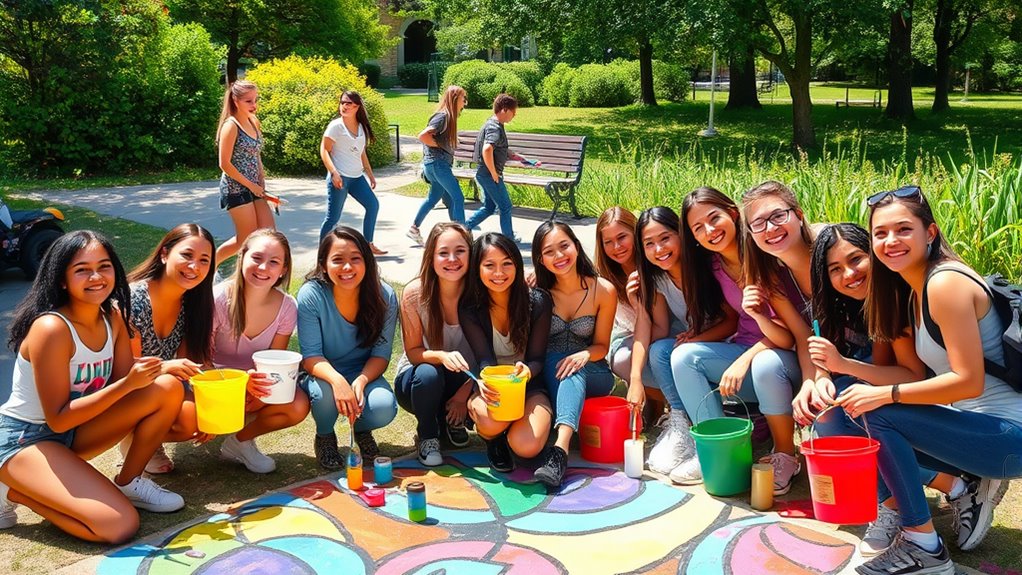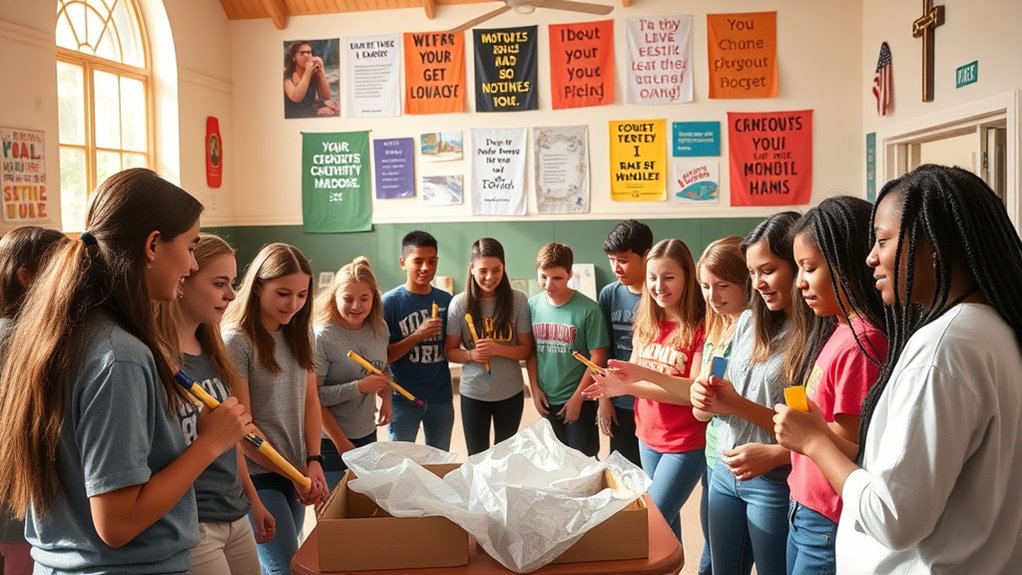To empower teens to serve, involve them actively in ministry by recognizing their unique gifts and offering leadership roles. Create a welcoming, youth-friendly environment where they feel valued and confident to participate. Provide training, mentorship, and opportunities for service projects that align with their interests. Celebrate their contributions to foster pride and purpose. Keep nurturing their growth, and you’ll discover how inspired and committed your youth can become in making a difference.
Key Takeaways
- Create leadership roles like small group leaders or event planners to foster ownership and confidence.
- Offer training and skill development programs to prepare teens for meaningful service opportunities.
- Recognize and celebrate youth contributions to reinforce their value and motivate ongoing involvement.
- Provide dedicated, welcoming spaces that encourage peer interaction and a sense of belonging.
- Involve teens in planning and decision-making to empower them and align activities with their interests and gifts.
Recognizing and Nurturing Teen Gifts

Recognizing and nurturing teen gifts is essential to helping young people reach their full potential. When you identify a teen’s talent, you open the door for them to grow confident and motivated. Gift recognition involves observing their natural abilities and encouraging them to develop these strengths. This process helps teens see their value and understand how they can contribute meaningfully to your community. By providing opportunities for them to showcase their teen talent, you foster a sense of purpose and belonging. Remember, every teen’s gift is unique, and supporting their development requires active listening and personalized encouragement. When you nurture these gifts early, you empower teens to serve with passion and confidence, laying a strong foundation for future leadership and service. Recognizing spiritual gifts can also guide you in helping teens discover their specific roles within the church body.
Creating Leadership Opportunities for Youth

Creating leadership opportunities for youth is a powerful way to foster their growth and engagement. You can do this by offering teen mentorship programs, where older teens guide and encourage younger ones, building confidence and leadership skills. Organize leadership retreats that challenge teens to develop teamwork, communication, and problem-solving abilities in a supportive environment. These retreats also help teens see their potential as future leaders within the church community. Giving teens responsibilities, such as leading small groups or planning events, further cultivates their leadership capacity. By intentionally creating these opportunities, you empower youth to step into meaningful roles, fostering confidence and a sense of ownership in their faith journey. This approach guarantees they feel valued and motivated to serve actively.
Building a Youth-Friendly Church Environment

You can make your church more welcoming by creating dedicated spaces where teens feel comfortable and engaged. Encourage peer leadership to help teens take ownership and build confidence within the community. Most importantly, foster a safe atmosphere where teens can freely express themselves and grow in faith. Incorporating elements that promote emotional well-being can further support their personal development.
Create Youth Spaces
Building a youth-friendly church environment starts with intentionally designing spaces that invite teens to feel welcomed and engaged. Create areas where teens can relax, connect, and be themselves, like designated teen hangouts that foster friendships and open dialogue. Incorporate comfortable seating, vibrant decor, and spaces for both quiet reflection and lively activities. Planning regular youth retreats also helps build community outside regular services, giving teens a safe place to explore faith and develop leadership. These retreats should be lively, inclusive, and tailored to teens’ interests, making them feel valued. When your church invests in creating dynamic, inviting spaces, teens will naturally feel more connected and motivated to participate in the life of the church. This foundation encourages ongoing involvement and growth. Additionally, designing spaces with a cozy, farmhouse-inspired ambiance can make teens feel more comfortable and at home within the church environment.
Encourage Peer Leadership
Empowering teens to take on leadership roles within your church encourages a sense of ownership and belonging. When teens see their peers leading, peer influence naturally promotes active participation and enthusiasm. You can harness social networking by encouraging teens to connect and share ideas, fostering a supportive community where leadership spreads organically. By involving youth in planning events or mentoring younger members, you give them opportunities to influence peers positively. This approach builds confidence and strengthens their commitment to the church. Recognizing peer leadership also models healthy collaboration, inspiring others to step forward. Additionally, understanding the importance of color accuracy can help in creating engaging visual materials that resonate with youth. Remember, when teens lead, they feel valued and motivated to serve, creating a vibrant, youth-friendly environment that thrives on peer influence and active social engagement.
Foster Safe Atmosphere
Creating a safe atmosphere is essential for making your church a welcoming space where teens feel comfortable to participate and grow. When your church decor is vibrant yet calming, it encourages teens to feel at ease and belong. Choose sermon topics that resonate with their experiences, showing that their concerns matter. A secure environment fosters trust and openness, crucial for their spiritual development. To evoke emotion, consider this table:
| Feelings | What You Can Do | Impact |
|---|---|---|
| Valued | Use inclusive decor and language | Builds confidence |
| Safe | Address relevant sermon topics | Promotes trust |
| Connected | Encourage peer interaction | Strengthens community |
| Inspired | Celebrate their gifts | Sparks motivation |
Additionally, fostering a culture that embraces creativity can help teens express themselves and feel more engaged within the church community.
Mentoring and Supporting Teen Leaders

Supporting teen leaders requires more than just assigning responsibilities; it involves actively guiding them through mentorship and tailored encouragement. Teen mentorship is essential to help them develop confidence, leadership skills, and a sense of purpose. Engage in youth counseling to address their concerns and provide emotional support, fostering trust and open communication. Regular check-ins allow you to recognize their strengths and offer constructive feedback. By investing time in mentoring, you help teens navigate challenges and build resilience. Your guidance empowers them to lead effectively and serve with passion. Remember, your support makes a lasting impact, helping teens grow into confident, capable leaders who can inspire others in your ministry. Recognizing the importance of teen leadership development can further enhance their growth and effectiveness.
Encouraging Peer-to-Peer Ministry

Encouraging peer-to-peer ministry starts with helping teens build strong connections with one another. When they feel connected, they’re more motivated to serve and support each other. Proper training equips these young leaders to make a lasting impact within their peer groups.
Building Peer Connections
Have you ever noticed how teens are more likely to listen and respond when their peers are involved? Building peer connections fosters social bonding and peer support, making ministry more effective. When teens connect authentically, they feel valued and understood, encouraging them to participate actively. Strong peer relationships create a supportive environment where teens can share struggles and successes, strengthening their faith and community ties. To promote this, organize small groups or peer-led activities that emphasize shared experiences and mutual encouragement. These connections help teens see their role in ministry as personal and impactful. Remember, by nurturing these peer bonds, you’re empowering teens to take ownership of their faith journey and inspire others along the way. Additionally, understanding store hours can be useful when planning events or outings to ensure maximum participation.
Training Young Leaders
Training young leaders is essential for fostering sustainable peer ministry, as it empowers teens to take initiative and guide others effectively. When you invest in their leadership development, you create opportunities for meaningful intergenerational dialogue and enhance community outreach. Well-trained teens can facilitate conversations between different age groups, strengthening connections and understanding within your church. To maximize impact, focus on:
- Providing leadership workshops and skill-building sessions
- Encouraging mentorship from experienced adults
- Fostering open communication and feedback
- Promoting active involvement in community outreach projects
- Equipping teens with conflict resolution and teamwork skills
Materials range from ceramic to recycled products.
Incorporating Service Projects Into Youth Programs

Integrating service projects into youth programs gives teens hands-on opportunities to develop empathy and leadership skills while making a tangible difference in their communities. To do this effectively, focus on community outreach that aligns with your teens’ interests and needs. Start with clear service planning, defining goals, roles, and timelines to keep projects organized and impactful. Encourage your youth to brainstorm ideas that resonate with their passions and the community’s needs. By involving them in every step, from planning to execution, you empower teens to take ownership and see the real-world impact of their efforts. These projects foster a sense of purpose and connection, building skills that will serve them well beyond their teenage years. Additionally, applying leadership frameworks can help structure the project management process and ensure sustainable engagement.
Providing Training and Skill Development

Providing training and skill development is essential to guarantee teens can effectively contribute to service projects and grow as leaders. You can use role playing exercises to simulate real-life situations, helping teens build confidence and problem-solving skills. Online certification programs are also valuable, offering flexible learning opportunities that reinforce important concepts. To maximize impact, consider these strategies:
Invest in role plays, online certifications, and hands-on mentorship to develop teen leaders effectively.
- Incorporate role playing exercises to enhance communication and teamwork
- Offer online certification to motivate ongoing learning
- Provide hands-on experience through mentorship and shadowing
- Focus on practical skills relevant to service activities
- Encourage reflection and feedback to foster continuous improvement
- Emphasize emotional support techniques to help teens navigate challenges and build resilience.
Celebrating and Highlighting Youth Contributions

Celebrating and highlighting youth contributions is a powerful way to inspire continued engagement and build confidence. When you recognize teen role models and their achievements, you show others that their efforts matter. Youth celebrations, whether through awards, testimonials, or public acknowledgment, motivate teens to stay active and committed. Highlighting their stories creates a sense of pride and belonging, encouraging them to take on leadership roles. By spotlighting their contributions, you foster an environment where young people feel valued and empowered. This recognition not only boosts individual confidence but also inspires peers to serve with enthusiasm. Ultimately, celebrating youth achievements reinforces their importance within the community and helps cultivate a vibrant culture of involvement.
Fostering a Culture of Purpose and Empowerment

Fostering a culture of purpose and empowerment starts with intentionally creating an environment where teens see their contributions as meaningful. When you prioritize teen empowerment within a purpose-driven ministry, you help youth realize their value and potential. To do this, encourage active participation, listen to their ideas, and celebrate their achievements. Make sure they understand how their efforts impact others and align with the ministry’s mission. Create opportunities for leadership and responsibility, showing that their voice matters. Remember, a purpose-driven ministry thrives when teens feel connected and valued. You can foster this culture by:
- Offering meaningful roles and tasks
- Providing ongoing encouragement
- Recognizing growth and effort
- Encouraging peer leadership
- Connecting their work to larger goals
Frequently Asked Questions
How Can Churches Effectively Involve Reluctant or Shy Teens?
To involve reluctant or shy teens, you can build their confidence through small, manageable roles that make them feel valued. Encourage peer mentoring, which helps shy teens connect with trusted friends and develop leadership skills. By creating a supportive environment where they feel safe and appreciated, you help boost their teen confidence, gradually empowering them to participate more actively in ministry. This approach makes service inviting rather than intimidating.
What Are Best Practices for Balancing Youth Autonomy With Adult Oversight?
Did you know 76% of teens say they want more leadership opportunities? To balance youth autonomy with adult oversight, prioritize teen empowerment by giving them meaningful responsibilities while providing guidance. Foster leadership development through mentorship and clear boundaries, ensuring teens feel trusted yet supported. Regular check-ins and open communication help maintain healthy oversight, allowing teens to grow confidently while respecting the wisdom of adults.
How Do Churches Measure the Impact of Youth Ministry Initiatives?
You measure the impact of youth ministry initiatives through youth engagement and program evaluation. Track attendance, participation, and feedback to gauge how involved teens are. Use surveys and focus groups to gather honest insights about what’s working and what’s not. Regularly reviewing these metrics helps you see growth, identify areas for improvement, and demonstrate the positive influence of your youth programs on young people’s spiritual and personal development.
What Resources Are Available for Training Youth Leaders?
You’ll find plenty of resources for training youth leaders, including leadership development programs, online courses, and workshops offered by denominational organizations. These tools help you develop essential skills like volunteer recruitment and team management. Many ministries also provide mentorship opportunities and curriculums designed specifically for youth leadership. By investing in these resources, you empower your teens to grow as confident, capable leaders who can inspire and serve their peers effectively.
How Can Parents Support Teens’ Involvement in Ministry?
You can support your teen’s involvement in ministry by encouraging their faith development and fostering teen mentorship opportunities. Show genuine interest in their spiritual growth, pray with them, and discuss their experiences. Offer to volunteer alongside them or connect them with mentors. Your active engagement and positive reinforcement help build their confidence, deepen their faith, and inspire them to serve more effectively in their ministry roles.
Conclusion
By embracing your teens’ gifts and empowering them to serve, you ignite a ripple of purpose that can transform your church. When you create opportunities, nurture leadership, and celebrate their efforts, you’re not just building programs—you’re shaping tomorrow’s leaders. Let their voices echo, their passions ignite, and their service become a chorus of faith in action. Together, you forge a future where youth don’t just participate—they lead, inspire, and carry the torch of ministry forward.










